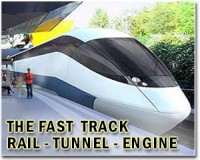| . |  |
. |
Beijing (AFP) Feb 2, 2011 Getting home for Chinese New Year used to mean squeezing into rundown trains that creak their way through the countryside. But this year, many are opting for the comfort and ever-expanding network of China's high-speed trains, even if it means paying on average more than three times more -- sparking concern the not-so-wealthy are losing out. "High-speed trains do not benefit middle- and low-income segments of the population," Zhao Jian, a professor at the Economy Management Institute of Beijing Jiaotong University, told AFP. "They might benefit rich people, giving them another travel option. But we build railways to promote economic development, not to serve one particular group of people." China's high-speed rail network, already the world's largest, is expanding quickly. Railways minister Liu Zhijun said last month it would reach 13,000 kilometres (8,000 miles) this year, a more than 50 percent jump from 2010. The sleek trains offer a respite from the cramped conditions often experienced by the tens of millions of people travelling for the Lunar New Year, China's most important holiday, which this year falls on Thursday. The week-long holiday is sometimes the only occasion in the year for families to reunite. And at Beijing's main train station, many travellers said they would be happy to pay more if it meant getting home earlier. "I got up at one this morning to get a ticket, and only got it at 10. I couldn't get a seat so I'll be standing 16 hours on the train to get home," Zuo Changming, who was headed to the northeastern city of Harbin, told AFP. "I'd prefer a high-speed train as at least I'd get a seat, but those tickets sold out," said the 24-year-old, who works in the hospitality industry. Wang Zhiguo, vice railways minister, told reporters on Sunday that so far, nearly 20 percent of all rail passengers had opted for high-speed trains during the travel period. But some passengers, experts and even state media have expressed fears that the fast trains have left people with no option but to pay more out of their small salaries for tickets. Liu Weidong, a migrant worker in the eastern city of Hangzhou, said he had had to pay an extra 400 yuan ($60) for his family to go home this year -- one third of his monthly pay. "To us, 400 yuan is a lot of money. With that money, we could have bought many things for the festival," he told the Xinhua news agency after failing to secure ordinary tickets home to the neighbouring province of Jiangxi. Resentment has spread online, creating a popular buzz word -- "bei gaotie" -- meaning having to buy more expensive tickets because normal trains are no longer available. "The railways ministry says problems during Chinese New Year arise because there is not enough transport capacity, adding that this (capacity) has clearly increased this year," one online user wrote on popular web portal sina.com. "But unfortunately, they have only increased transport capacity with high-speed trains, which are too expensive for migrant workers, who now have to ride their motorbikes home." Gerald Ollivier, senior infrastructure specialist at the World Bank in China, however says that high-speed railways could actually benefit poorer segments of the population. "Part of the population has shifted from traditional trains to high-speed rail travel, which frees up the seats they would have used on traditional trains," he said. "The high-speed rail essentially broadens the range of travel options available to the Chinese population. But the true test is whether these trains are full during peak times, and if that's the case, then it matches demand."
Share This Article With Planet Earth
Related Links Great Train Journey's of the 21st Century
 China tycoon willing to fund Taiwan rail link: report
China tycoon willing to fund Taiwan rail link: reportTaipei (AFP) Jan 31, 2011 China's most famous philanthropist, who is currently visiting Taiwan, has said he would be willing to help finance a rail link between the island and the mainland, Taipei-based media said Monday. Chen Guangbiao, who has spent nearly a week in Taiwan doling out money to the island's poor, made the suggestion Sunday while speaking to an audience in the northern county of Taoyuan, the China Tim ... read more |
|
| The content herein, unless otherwise known to be public domain, are Copyright 1995-2010 - SpaceDaily. AFP and UPI Wire Stories are copyright Agence France-Presse and United Press International. ESA Portal Reports are copyright European Space Agency. All NASA sourced material is public domain. Additional copyrights may apply in whole or part to other bona fide parties. Advertising does not imply endorsement,agreement or approval of any opinions, statements or information provided by SpaceDaily on any Web page published or hosted by SpaceDaily. Privacy Statement |